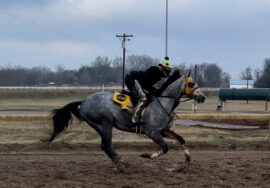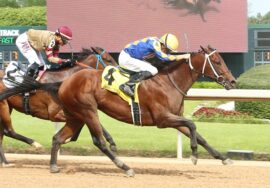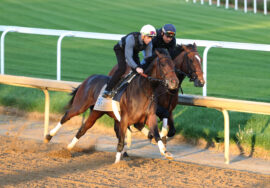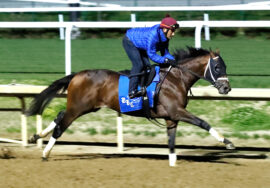
New ARCI chair calls for common sense in HISA rules, federal funding
An ARCI press release (Doug Moore photo courtesy ARCI)
The new Chair of the Association of Racing Commissioners International (ARCI), Commissioner Doug Moore of Washington State, called for racing industry unity and common sense reforms to the HISA anti-doping and medication control program as well as federal funding for HISA in his inaugural remarks at the ARCI Annual Meeting just concluded.
Moore called for a reassessment of how penalties are assessed and noted that HISA is using a “one size fits all” approach in assessing fines.
“Previously, these fines varied from jurisdiction to jurisdiction, creating an illusion of inconsistent application of the rules. But the fact of the matter is that uniform fines are anything but uniform. Fines were and need to be assessed based on the financial structure of individual tracks. An equal fine assessed to a trainer at a track running for a purse structure of up to $500,000 per day is not the same as one given to a trainer racing where the daily purses are $100,000 per day.
“In one instance, it may be an appropriate amount to change behavior; in the other case, it is an amount that creates not just a change of behavior but results in a financial loss that results in a trickledown effect that results in unpaid wages to their employees, and unpaid bills to feed suppliers and other vendors,” he said. “This is resulting in not only trainers leaving the business, but owners as well.”
He proposed that HISA consider a structure for penalties based on the economics and purses offered at the different tracks.
“The Authority has done this for jockeys for riding crop violations, and I call on them to consider the same approach for trainers,” he said.
In addressing the increased regulatory costs that the thoroughbred industry must now bear, Moore said, “Congress should have been asked for a funding solution for what they created” and expressed fear that “within a few years there will only be a dozen or so tracks surviving.
“Most small and mid-size tracks and jurisdictions will simply be unable to afford the fees and costs associated with this second level of regulation, which certainly will continue to rise.”
Moore concluded his remarks by stating that he hopes “everyone can work together to overcome both the practical and financial issues that we face going forward and that my fears are wrong.”
The full text of Chairman Moore’s remarks can be accessed on the ARCI website www.arci.com.












